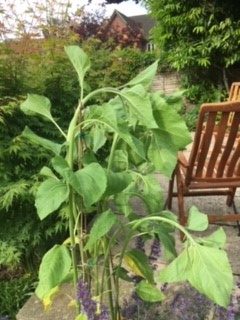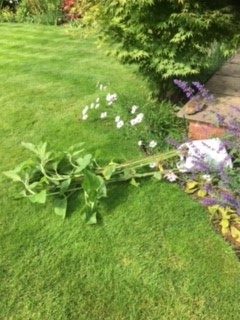“I looked into the garden this morning and was met by this sight – I thought my poor sunflowers were in urgent need of water – but no, the soil was damp. So why are they looking down?
Then I discovered they had fallen over in the wind during the night (hubby had corrected them), so make sure your pot is heavy and the flowers are staked! These I grew in a white plastic bag – no weight!
This incident caused me to reflect: They are called sunflowers- because they follow the sun… and you can see that in just four hours of sunlight my beautiful sunflowers had sorted themselves out, sussed where they were, identified what was important and got on with making the most of a complex situation, what I thought was wilting when seen from one perspective was in fact striving and succeeding when the full picture was revealed. From lying down, they had turned and reached out for the sun.
And that’s partly why I chose the sunflower challenge. Sunflowers are like Liaise co-workers – you have adapted to COVID conditions with amazing resilience and skill. The photos of all the activities at home have been amazing. We all know that being restricted in our movements has helped us reflect on what really matters and supports and motivates us. Please do not lose sight of what you have established in your homes as the world becomes more available to us. Shops are opening but will be used in a very different way – before returning to a bigger world check out why we would do this, view it from all angles – don’t assume like me with my sunflower, that we know the cure – if I’d given it more water, I would have ended up drowning it! The world is slowly opening but before we get back out there… check we have considered all the viewpoints (and remember, we may face temporary lockdown again).
What do we need to do?
What do we need to do?
We must not be going in and out of shops too frequently
Review the service user activity schedules? This does not mean an immediate return to pre COVID-19 with lots of community trips as COVID-19 is still here.
We can support service user visits if they need new clothing for instance or new games, but this should not be daily. Please be aware that changing rooms will remain closed for the time being, so nobody will be able to try clothes on until they arrive back home
We should support service users with a social story explaining to them that they may need to wear a mask (practice this in house)
Within the social story you need to include queuing to go into the shop/social distancing/people wearing masks/one-way systems, and that coffee shops or cafes may not be open
So, if you are thinking of introducing trips to town, ensure that you review the service user’s community risk assessment and ask yourself things like:
Will this visit increase their risk of contracting COVID-19 – Yes/No
Meeting more people wearing masks, all walking in lines (as set out in shopping centres) – will this cause them too much stress – Yes/No?
Do they understand social distancing – Yes/No
Will they wear a mask – Yes/No
Are they able to stand and wait – Yes/No
They will not be able to roam around a shop, but will have to follow the same route as others will they do this– Yes/No
Within a webinar I recently joined a number of participants were commenting on how many people with autism are actually thriving in current conditions – happy at home! Safe and secure! Making the most of the easy access to the free resources their homes offer – hobbies, gardens, rest relaxation. A woman who organises a Facebook page for parent support reported that a significant number are saying, particularly in relation to girls, that they are so much calmer since lockdown started.
Dr Pooky Knightsmith – a very skilled, eloquent autistic woman gave a presentation within the webinar, she was brilliant at presenting yet when it came to discussion after the presentation you could see signs of anxiety about the topic of returning to the community, she admitted her anxiety, and I thought that was a great thing to reflect on for our service users! So please, you must ask yourselves, if service users are comfortable in their daily lives currently, is there a need to rush back to more stressed times? You know each service user in your home best – but please value the climates you have created and don’t lose them in our rush to conform. Like the sunflower, strive for the lifestyle we know suits each of our service users and the key aim should be safety and security. You have been providing that in gallons – thank you”.
Liaise has 11 care homes based in the Basingstoke area and Romsey in Hampshire and are part of Liaise. Find out more at www.liaise.com about our work and the homes. Or to find out more about a career with us, email people@liaise.com











